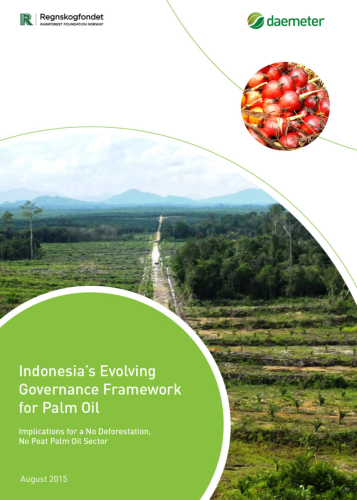
Indonesia’s Evolving Governance Framework for Palm Oil: Implications for a No Deforestation, No Peat Palm Oil Sector
Authors: (in alphabetical order) Leony Aurora, Blair Palmer, Gary Paoli, Rauf Prasodjo, and Jim Schweithelm
Publisher: Daemeter Consulting
Sep 2015
It has been an incredibly dynamic two years socially, politically, and in the palm oil market place in Indonesia. Much has changed in the policy and legal arena affecting land governance, and is continuing to change at a rapid pace. On the positive side this creates new opportunities (especially for land reform) and chips away at some of the major impediments to reform (e.g. lack of transparency and accountability in local governance), while on the other hand some of the key barriers to change have intensified (e.g. the lack of legal basis to conserve forests within plantations).
This report analyses recent changes in the legal and policy frameworks in Indonesia to understand their effects on deforestation and offer recommendations for strengthening and improving this framework.These include changes affecting forest and land management, customary land rights, distribution of government powers, plantations management, and biofuels development. The report highlights near term actions that can be taken by different actors to take advantage of new opportunities, and draws attention to issues on which lobbying efforts can be focused and coordinated to broaden the constituency for reform.
The report was commissioned by the Rainforest Foundation Norway and has been made possible through the generous of the Ford Foundation.

